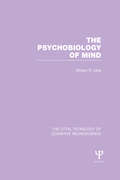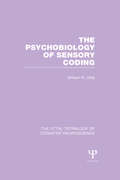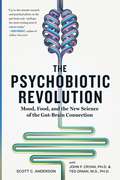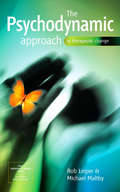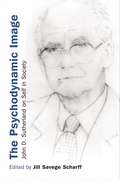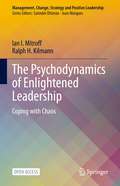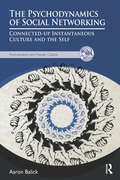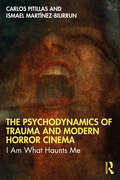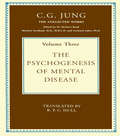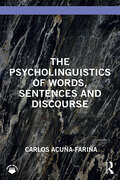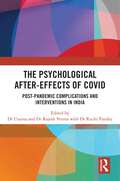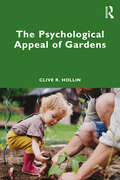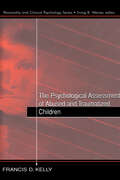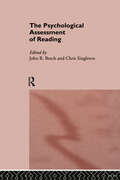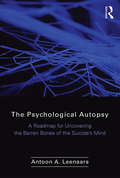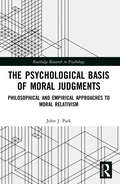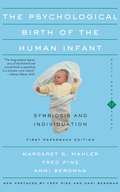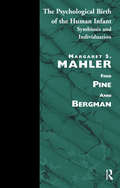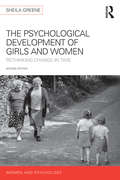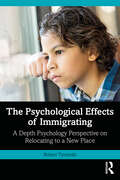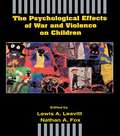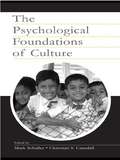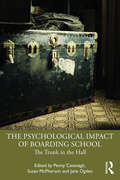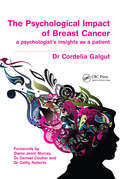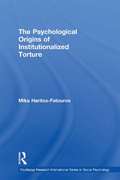- Table View
- List View
The Psychobiology of Mind (The Uttal Tetralogy of Cognitive Neuroscience)
by William R. UttalOriginally published in 1978, this book develops a conceptual synthesis of the field of physiological psychology, the science specifically concerned with the relationship between the brain and the mind. It was designed to elucidate the important questions under investigation, the basic intellectual and technical problems that were encountered, and the significance of the major empirical results of the time. Of equal or even greater importance is the author’s derivation of the general principles relating brain and mind that had emerged after decades of modern research into this important question. Included in the volume are historical and philosophical perspectives on the mind-brain problem as well as extensive discussions of instruments, methodology, empirical findings and theory. Here is a powerful heuristic tool that informs the reader about the concepts and ideas implicit in this science rather than simply exhaustively listing experimental results. The author does not ignore findings; he organizes them into three broad categories – localization; representation, and learning – then emphasizes the relationships among experiments. This is a book that synthesizes, integrates, and stresses concepts, principles and problems. The careful organization of the book makes it especially useful for students of brain and mind at all levels.
The Psychobiology of Sensory Coding (The Uttal Tetralogy of Cognitive Neuroscience)
by William R. UttalOriginally published in 1973, this book deals with what were, even at that time, the well-known neural coding processes of the sensory transmission processes. The book was written to demonstrate the common features of the various senses. It concentrates on the most peripheral neural aspects of the senses starting with the physical transduction process and culminating in the arrival of signals at the brain.
The Psychobiotic Revolution: Mood, Food, and the New Science of the Gut-Brain Connection
by John F. Cryan Scott C. Anderson Ted DinanWritten by the leading researchers in the field, this information-rich guide to improving your mood explains how gut health drives psychological well-being, and how depression and anxiety can be relieved by adjusting your intestinal bacteria. This groundbreaking book explains the revolutionary new science of psychobiotics and the discovery that your brain health and state of mind are intimately connected to your microbiome, that four-pound population of microbes living inside your intestines. Leading medical researchers John F. Cryan and Ted Dinan, working with veteran journalist Scott C. Anderson, explain how common mental health problems, particularly depression and anxiety, can be improved by caring for the intestinal microbiome. Science is proving that a healthy gut means a healthy mind—and this book details the steps you can take to change your mood and improve your life by nurturing your microbiome.
The Psychodynamic Approach to Therapeutic Change (SAGE Therapeutic Change Series)
by Rob Leiper Michael Maltby`It is well written and well organised and I'm sure it will be of help and interest to researchers and practitioners concerned with the therapeutic action of psychodynamic treatment' - Penelope Waite, Nurturing Potential Change is the central purpose of all counselling and psychotherapy, but how it is conceptualized and worked with varies according to the theoretical approach being used. The Psychodynamic Approach to Therapeutic Change explores the nature of psychological change from the psychodynamic perspective and describes the process through which clients can be helped to come to terms with painful experiences and develop new ways of relating. In the first part of the book, Rob Leiper and Michael Maltby look at therapeutic change in relation to psychological health and maturity. They explore what motivates people to change and also why resistance occurs. The main part of the book outlines the collaborative process that clients and therapist work through to bring about change and highlights the role of the therapist in: ] creating the conditions for clients to express their thoughts, feelings and memories ] developing clients' awareness and understanding of their psychological processes, and ] providing `containment' for the client's psychological projections. The final part of the book sets personal therapeutic change in a wider social context, linking individual change with community and organisational development. Combining core psychodynamic concepts with contemporary thinking, The Psychodynamic Approach to Therapeutic Change provides a lively and up-to-date integration of ideas on the change process which will be of great value to trainees and practicing counsellors and psychotherapists.
The Psychodynamic Image: John D. Sutherland on Self in Society
by Jill Savege ScharffThe Psychodynamic Image is the first selection of John D. Sutherland’s major papers. It provides an overview of the development of his thought on self and society and reveals the extent of his contribution to the field of mental health. Jill Savege Scharff introduces Sutherland’s most important and influential essays. These reflect his range as a theoretician, moving easily from the intrapsychic to the interpersonal level, building bridges between points of view and integrating psychoanalytic and social theories. Sutherland’s work calls for changes at the individual level through understanding conflicts and unconscious processes as aspects of parts of the self in interaction. He inspires respect and understanding of the self and its drive toward autonomy. These papers push the boundaries of psychoanalytic thinking and succeed in demonstrating the relevance of psychoanalysis to the wider society. They will be of great interest to psychoanalysts, psychotherapists, counsellors and social workers.
The Psychodynamics of Enlightened Leadership: Coping with Chaos (Management, Change, Strategy and Positive Leadership)
by Ian I. Mitroff Ralph H. KilmannThis open access book provides a comprehensive look at the pluses and minuses of leadership in times of an unparalleled crisis, such as the COVID-19 global pandemic. It examines the COVID-19 crisis in terms of psychodynamics, crisis management, and especially from the standpoint of complex, messy systems. It analyses how leaders need to think and act differently to cope better with—and potentially prevent—future crises.
The Psychodynamics of Social Networking: Connected-up Instantaneous Culture and the Self (The\psychoanalysis And Popular Culture Ser.)
by Dr. Aaron BalickOver the past decade, the very nature of the way we relate to each other has been utterly transformed by online social networking and the mobile technologies that enable unfettered access to it. Our very selves have been extended into the digital world in ways previously unimagined, offering us instantaneous relating to others over a variety of platforms like Facebook and Twitter. In The Psychodynamics of Social Networking, the author draws on his experience as a psychotherapist and cultural theorist to interrogate the unconscious motivations behind our online social networking use, powerfully arguing that social media is not just a technology but is essentially human and deeply meaningful.
The Psychodynamics of Trauma and Modern Horror Cinema: I Am What Haunts Me
by Carlos Pitillas Ismael Martínez-BiurrunIn this illuminating volume, Carlos Pitillas and Ismael Martínez-Biurrun provide in-depth analysis of contemporary horror films from a psychoanalytic perspective.Drawing on Freudian psychoanalysis, object relations theory and relational psychoanalysis, the authors explore the ways in which horror films present different aspects of traumatic phenomenology and the re-emergence of unprocessed traumatic wounds. Covering films as diverse as Psycho, The Babadook, Black Swan, and A Nightmare on Elm Street, the authors dissect the use of symbolism and metaphors in popular horror cinema to show how the disruptive threats faced by characters in these films often function in the same way as post-traumatic stress disorder, and consider behaviours such as repetitive thoughts and actions, dissociation, and more through the lens of neuroscience and narrative theory.This book is an important and novel read for all psychoanalysts in practice and training looking for new ways to understand and work with clients who have experienced traumatic life events. The authors’ use of familiar and canonical horror films also equips students and researchers of film studies with the knowledge necessary to integrate psychoanalytic theories into their work.
The Psychogenesis of Mental Disease (Collected Works of C.G. Jung)
by C.G. JungFirst published in 1960. Routledge is an imprint of Taylor & Francis, an informa company.
The Psycholinguistics of Words, Sentences and Discourse
by Carlos Acuña-FariñaThe Psycholinguistics of Words, Sentences and Discourse introduces the way words, sentences and discourse live in the mind. Actual language use is about putting together words into syntactic frames that make sense in a specific context. This book provides an overview of the many mental processes involved in that, explaining how the mind conjures up specific words and syntactic structures in a particular situation of discourse.The book: Offers an overview of historic research milestones as well as more recent developments and research in psycholinguistics Introduces how words, sentences and discourse are processed in the mind Answers questions such as what is needed to develop a linguistic capacity, and how current technology can help us enter the linguistic mind with a chapter on AI and language Includes definitions of key linguistic terms, chapter outlines, discussion questions, suggestions for further reading and summaries of key points This entertaining and informed introduction to the psychological reality of the human language faculty will be of interest to students and researchers in psycholinguistics, experimental psychology and artificial intelligence.
The Psychological After-Effects of Covid: Post-Pandemic Complications and Interventions in India
by Rajesh Verma Dr Uzaina Ruchi PandeyThis comprehensive resource provides a one-stop information repository, exploring all psychological aspects of Covid-19. It documents the after-effects of the Covid pandemic, and how it transformed India as a society and its citizens as individuals. The book covers the psycho-social impact on society and individuals and our collective behaviour, as well as coping strategies and interventions and how lessons learned will help in preparedness for the future.Including case studies and the latest research, this book examines how psycho-social paradigms changed as a result of the pandemic, and left their watermark on the human psyche. It also explores the coping strategies adopted to deal with this common aggressor and how the techniques varied in accordance with social, cultural and geographical factors. The final chapters offer new insights for the future, highlighting the psychological infrastructure required, the type of preparedness and handling strategies necessary to mitigate the impact of any future biogenic pandemics.Combining theory and practical application, it will be valuable reading for academics and researchers as well as practising psychologists, clinical psychologists, and law-makers who are concerned with mental health.
The Psychological Appeal of Gardens
by Clive R. HollinThis insightful book explores the relationship we have with gardens and with the act of gardening, considering in detail the psychological, social and health benefits. From the Garden of Eden and the Hanging Gardens of Babylon to Kew Gardens and the humble suburban plot, it is self-evident that gardens and gardening have an ever-present attraction. This book addresses the appeal of gardens from a psychological perspective: Why do we spend our cash on plants and gardening paraphernalia and give hours of our time to tending our annuals, bulbs and shrubs? Why do we travel to see gardens in our own and other countries? The theme of this book lies in identifying the individual and social rewards to be found in gardens and gardening, particularly within our own private gardens. The Psychological Appeal of Gardens will be of great interest to students and scholars of applied psychology, as well those taking horticultural courses of various levels, from professional horticulturalists to enthusiastic amateurs.
The Psychological Assessment of Abused and Traumatized Children (Lea Series In Personality And Clinical Psychology)
by Francis D. KellyThe past decade has seen more and more clinicians involved in the assessment and treatment of abused and traumatized children. They have contributed to an impressively large body of literature on the impact of abuse and trauma at all ages, the focus of which has been the short and long-term sequelae apparent in the child's behavior, emotional experience, and social interaction. But there have been few efforts to investigate the ways in which abuse and trauma damage the intrapsychic systems and structures that often guide, direct, and inform the child's manifest adjustment and functioning. The need to redress the balance was the major impetus for this book. Kelly offers a clinical paradigm for the personality assessment of abused or traumatized children via projective instruments--the TAT and Rorschach--and shows how various projective measures and indices can be utilized as sensitive barometers of changes in self, object, and ego functioning following therapeutic interventions and other corrective experiences. But further, integrating the tenets of trauma theory and those of psychoanalytic theory, he sets this clinical paradigm in a meaningful theoretical context, and draws on both theory and clinical experience to develop a comprehensive psychological composite of the child who has been maltreated. Part I provides an overview of theoretical models relevant to the assessment and diagnosis of the maltreated child. Contemporary psychoanalytic theory serves as one frame and is discussed first, with particular emphasis on object relations and ego functions. Equal attention is devoted to developmental psychology as another frame. Part II reviews relevant research. The Mutality of Autonomy Scale (MOA) and the Social Cognition and Object Relations Scale (SCORS) are introduced as examples of reliable and valid instruments readily employed to assess the impact of abuse or trauma on a child's object relations functioning. Additional Rorschach indices--boundary disturbance measures, thought disorder indices, trauma markers, and defensive functions measures--are discussed as measures of the impact on different facets of ego functioning. These various projective measures can be utilized as sensitive barometers of changes in self, object, and ego functioning following therapeutic interventions and other corrective experiences. Part III includes a variety of extended clinical illustrations. Seven cases of boys and girls subjected to varying degrees of abuse and trauma are presented to demonstrate the clinical utility of projective material for assessment, diagnosis, and treatment planning. For the clinician who takes the idiographical-phenomenological approach, appropriate given the uniqueness of each situation of abuse or trauma and the frequent brevity and barrenness of the protocol, such material can open a window onto a rich vista of the child's psychological terrain. The resulting map can point the way to wise decisions about type, timing, and level of therapeutic intervention, the resolution of such process issues as transference and countertransference, plus additional questions. Two cases of adult women who were abused as children and find themselves continuing to struggle with enduring unresolved issues vis a vis their own children are also presented. These cases underscore the value of TAT and Rorschach material, and object relations measures, in assessing and understanding the abusive and potentially abusive parent.
The Psychological Assessment of Reading
by John Beech Chris SingletonA useful guide to best practice including reviews of the latest and most helpful tests available. In Part One, contributors discuss the theory of reading assessment including issues such as screening, legal aspects, memory and visual problems, computer based assessment and the dyslexias. Part Two contains the review section where experts give comprehensive reviews of named tests.
The Psychological Autopsy: A Roadmap for Uncovering the Barren Bones of the Suicide's Mind
by Antoon LeenaarsThe best way to grasp the essence of death scene investigation (DSI) is to witness its application, called the psychological autopsy, by an expert forensic scientist/clinician. This remarkable book affords the opportunity to delve into the challenges that the forensic mental health specialist and public safety professional confront in DSI. Suicides, and often death, are complex, multidetermined events. People, whether police investigators or mental health professionals, are generally perplexed, and even confused, when they are confronted by the equivocal case. Was it a suicide? Homicide? Accident? These are critical questions. Dr. Leenaars shows that DSI is, however, not mysterious; the reader can learn the generally accepted, evidence-based protocols of the psychological autopsy. Illuminated by individual (idiographic) case studies and general (nomothetic) research, this definitive guide allows the investigator to uncover the bare bones of a suicide or death.
The Psychological Basis of Moral Judgments: Philosophical and Empirical Approaches to Moral Relativism (Routledge Research in Psychology)
by John J. ParkThis volume examines the psychological basis of moral judgments and asks what theories of concepts apply to moral concepts. By combining philosophical reasoning and empirical insights from the fields of moral psychology, cognitive science, evolutionary psychology, and neuroscience, it considers what mental states not only influence, but also constitute our moral concepts and judgments. On this basis, Park proposes a novel pluralistic theory of moral concepts which includes three different cognitive structures and emotions. Thus, our moral judgments are shown to be a hybrid that express both cognitive and conative states. In part through analysis of new empirical data on moral semantic intuitions, gathered via cross-cultural experimental research, Park reveals that the referents of individuals’ moral judgments and concepts vary across time, contexts, and groups. On this basis, he contends for moral relativism, where moral judgments cannot be universally true across time and location but only relative to groups. This powerfully argued text will be of interest to researchers, academics, and educators with an interest in cognitive science, moral theory, philosophy of psychology, and moral psychology more broadly. Those interested in ethics, applied social psychology, and moral development will also benefit from the volume.
The Psychological Birth of the Human Infant: Symbiosis and Individuation
by Margaret S. Mahler Fred Pine Anni BergmanThe pioneering contribution to infant psychology that gave us separation and individuation documents with standard-setting care the intrapsychic process of a child's emergence from symbiotic fusion with the mother toward affirmation of his own psychological birth. Available for the first time in paperback to a new generation of students and clinicians on the twenty-fifth anniversary of its original publication.
The Psychological Birth of the Human Infant: Symbiosis and Individuation (Maresfield Library)
by Margaret S. Mahler'The biological birth of the human infant and the psychological birth of the individual are not coincident in time. The former is a dramatic, observable, and well-circumscribed event; the latter a slowly unfolding intra psychic process.'Thus begins this highly acclaimed book in which the author and her collaborators break new ground in developmental psychology and present the first complete theoretical statement of the author's observations on the normal separation-individuation process. Separation and individuation are presented in this major work as two complementary developments. Separation is described as the child's emergence from a symbiotic fusion with the mother, while individuation consists of those achievements making the child's assumption of his own individual characteristics. Each of the sub-phases of separation-individuation is described in detail, supported by a wealth of clinical observations which trace the tasks confronting the infant and his mother as he progresses towards achieving his own individuality.
The Psychological Development of Girls and Women: Rethinking change in time (Women and Psychology)
by Sheila GreeneChoice Recommended Read This thoroughly revised new edition updates Sheila Greene's original transformative account of the psychological development of girls and women and the central role of time in shaping human experience. Greene critically reviews traditional and contemporary theoretical approaches – ranging from orthodox psychoanalysis to relational and post-modern theories – and argues that even those that claim to focus on development have presented a view of women's lives as fixed and determined by their nature or their past. These theories, she believes, should be rejected because of their inherent lack of validity and their frequently oppressive implications for women. Essential but often neglected insights from the more compelling developmental and feminist theories are woven together within a theoretical framework that emphasizes temporality, emergence and human agency. The result is a liberating theory of women's psychological development as constantly emerging and changing in time rather than as static and fixed by their nature, socio-cultural context and personal history. Updated for a new generation of readers, The Psychological Development of Girls and Women will continue to be essential reading for students and researchers in the psychology of women, developmental psychology and women's studies.
The Psychological Effects of Immigrating: A Depth Psychology Perspective on Relocating to a New Place
by Robert TyminskiExploring immigration from psychological, historical, clinical, and mythical perspectives, this book considers the varied and complex answers to questions of why people immigrate to entirely new places and leave behind their familiar surroundings and culture. Using research reviews, extensive case material, and literary examples (such as Virgil’s The Aeneid), Robert Tyminski’s work will deepen readers’ understanding of what is both unique and universal about migratory experiences. He addresses the negative consequences of xenophobia, the acculturation experiences of children compared to adults, the trauma and psychological issues that arise when seeking refuge or relocating to a new country, and the more recent implications of COVID-19 upon border crossings. Tyminski also re-evaluates the term identity as a psychological shorthand, suggesting that it can flatten our understanding of human complexity and erase migrant and refugee life stories and differences. As one of few books to investigate immigration from a Jungian-oriented perspective, Robert Tyminski’s work offers a new and broad perspective on the mental health issues related to immigration. This book will prove essential for clinicians working with refugees and migrants, when in training and in practice, as well as students and practitioners of psychoanalysis seeking to deepen their understanding of migratory experiences.
The Psychological Effects of War and Violence on Children
by Nathan A. Fox Lewis A. LeavittThe outgrowth of a conference planned as a response to the need for researchers and clinicians to develop integrated plans for addressing the psychological trauma of children exposed to violence, this volume's goals are: * to summarize research on the subject with particular emphasis on the Gulf War; * to use this information to formulate an outline of what current knowledge suggests are reasonable approaches to public mental health intervention; and * to develop an agenda for future research necessary for improving clinical efforts in varying international conflicts. A significant collection of diverse perspectives attending to a diversity of cultural and political contexts, the contributors offer many conclusions about important dimensions for analyzing the effects of violence on children. Suggesting informed approaches to public mental health efforts which can be implemented, the work presented here directs attention to the need for interdisciplinary collaboration among researchers and clinicians to better understand the effects of exposure to violence on the psychological well being of children and the optimal modes of remediation on individual, family, and community levels.
The Psychological Foundations of Culture
by Christian S. Crandall Mark SchallerHow is it that cultures come into existence at all? How do cultures develop particular customs and characteristics rather than others? How do cultures persist and change over time? Most previous attempts to address these questions have been descriptive and historical. The purpose of this book is to provide answers that are explanatory, predictive, and relevant to the emergence and continuing evolution of cultures past, present, and future. Most other investigations into "cultural psychology" have focused on the impact that culture has on the psychology of the individual. The focus of this book is the reverse. The authors show how questions about the origins and evolution of culture can be fruitfully answered through rigorous and creative examination of fundamental characteristics of human cognition, motivation, and social interaction. They review recent theory and research that, in many different ways, points to the influence of basic psychological processes on the collective structures that define cultures. These processes operate in all sorts of different populations, ranging from very small interacting groups to grand-scale masses of people occupying the same demographic or geographic category. The cultural effects--often unintended--of individuals' thoughts and actions are demonstrated in a wide variety of customs, ritualized practices, and shared mythologies: for example, religious beliefs, moral standards, rules for the allocation of resources, norms for the acceptable expression of aggression, gender stereotypes, and scientific values. The Psychological Foundations of Culture reveals that the consequences of psychological processes resonate well beyond the disciplinary constraints of psychology. By taking a psychological approach to questions usually addressed by anthropologists, sociologists, and other social scientists, it suggests that psychological research into the foundations of culture is a useful--perhaps even necessary--complement to other forms of inquiry.
The Psychological Impact of Boarding School: The Trunk in the Hall
by Jane Ogden Susan McPherson Penny CavenaghThe Psychological Impact of Boarding School is a collection of research-based essays answering a range of questions about boarding school and its long-term impact. Through a combination of original in-depth first-person narratives as well as larger scale surveys, this book aims to fill gaps in current boarding school research and present new findings. Topics addressed include gender differences, eating behaviours, loneliness, mental health and relationships, the differences between younger and older boarders, and ex-boarder experiences of therapy. The research results highlight a key role in the age that children start boarding, the way that long-term psychological influences of friendships formed at school, and the larger role that parent and family relationships play in the psychological lives of boarders. Through these findings, the book ultimately challenges the current understanding of 'boarding school syndrome', proposing a move beyond the term and its concept. The book will appeal to psychologists, psychoanalysts, counsellors, academics, teachers, current and ex-boarders as well as parents and guardians interested in the impact of boarding schools from either a professional or a personal perspective.
The Psychological Impact of Breast Cancer: A Psychologist's Insight as a Patient
by Cordelia Galgut'It's rare to find a professional in the field of health care who understands the psychology of such a frightening experience and who has also been through it herself. Cordelia's book will ring true to every woman who has experienced breast cancer and will, I hope, offer insight to doctors and nurses.' - From the foreword by Jenni Murray OBE What is it like to experience breast cancer? This book presents rare and valuable insights into the impact of diagnosis, treatment and prognosis from a woman who has experienced breast cancer as both patient and as health professional. It informs and educates readers about the psychological realities of living with breast cancer, of treatments such as surgery and radiotherapy, and the impact of social and historical attitudes to the breast and breast cancer on a woman's experience of the disease. The conflicts Cordelia Galgut experienced between conventional wisdom and her own first-hand experience are explored vividly and reflectively. The Psychological Impact of Breast Cancer is vital reading for medical and mental health professionals and trainees working with breast cancer patients, and for those who are affected by or have an interest in the condition. 'The aim of this book, and the way forward, is to understand that we must all be more sensitive to the feelings of patients and to the suffering, uncertainty and sense of vulnerability that this disease imposes upon them.' - Dr Carmel Coulter in her Foreword 'This book has helped me understand the complexities that my patients present and has turned me into a better doctor. It has eased my way along the road that I now travel as a cancer survivor.' - Dr Cathy Roberts in her Foreword ]
The Psychological Origins of Institutionalized Torture (Routledge Research International Series in Social Psychology #No.4)
by Mika Haritos-FatourosOriginal research, including interviews with former Greek torturers, is supplemented by discussion of former studies, military records and other sources, to provide disturbing but valuable insights into the psychology of torture. The book describes parallel situations such as the rites of passage in pre-industrial societies and cults, elite Corps military training and college hazing, eventually concluding that the torturer is not born, but made.Of essential interest to academics and students interested in social psychology and related disciplines, this book will also be extremely valuable to policy-makers, professionals working in government, and all those interested in securing and promoting human rights.
